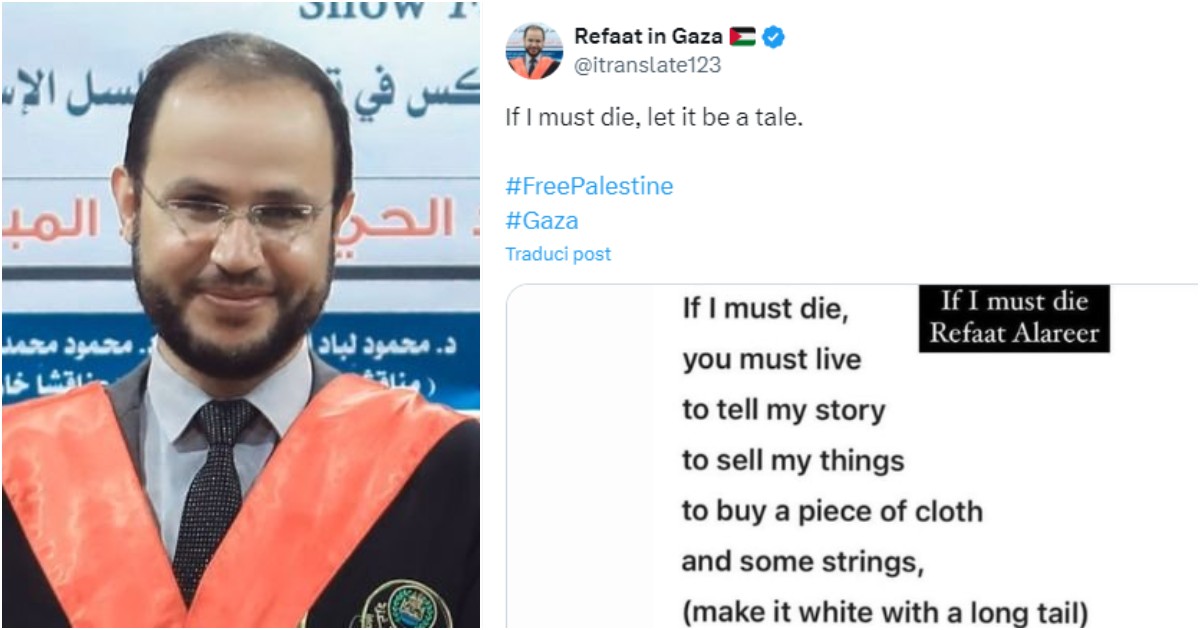by Federica Pistono*
Refaat Alareer (1979 – 2023) was a poet, writer and university professor of comparative literature at the Islamic University of Gaza. He was a co-founder of the project We Are Not Numbers, a non-profit organization created to promote a new generation of Palestinian writers, thanks to the collaboration between established international authors and young writers from Gaza. On the night between 6 and 7 December 2023, he was killed in an air attack in northern Gaza, along with six members of his family.
Leaves us a testimony, a work that tells of the will to resilience of the Palestinian people, determined not to surrender to death and suffering, but, on the contrary, always in search of freedom and hope even in the darkness of these times. The work is Gaza Writes Back (Lorusso Editore, 2019, translated by Luigi Lorusso in collaboration with V. Iacoponi), a collection of twenty-three storiesas many as the days of the Israeli operation Cast Lead, which took place in Gaza in 2008-09. These are stories written by fifteen authorshalf the result of the Creative Writing course held by Alareer himself at the Islamic University of Gaza.
The anthology is more relevant than ever in this historical moment, since the narrative, part of every cultural heritage, it allows the writer, but also the reader, to contextualise their past, attribute meaning and depth to it, connect it to their present and give shape to a future not yet outlined.
See also
Voices from Gaza – “Here in the north we can no longer find food. Many don’t eat for two or three days, you’re lucky when you manage to have a meal”
The twenty-three stories in the volume were written, with two exceptions, in English and, for the most part by women. This demonstrates how much young Palestinian writers have contributed, over the last twenty years, to using every tool available to preserve the Palestinian identity, resist the occupation, build a Palestinian society based on gender equality. These young authors approached writing first as bloggers, then as fiction writers, to participate in the struggle of their people, taking the lead in this form of political commitment, surpassing the number of male writers and promoting women’s issues.
The stories included in the collection are different in terms of themes, characteristics, forms, types and experiments. Although the intent of the book would be to narrate how young people in Gaza reacted to the Israeli military attack of 2008-09, the stories include the entire area of Palestine, rejecting any division. Some stories do not feature in fact a defined settingsuggesting that the story could happen anywhere in occupied Palestine, or for any people living under occupation.
The themes explored are many, but the main ones concern the terra, death and memory. The motif of the land emerges as a literary theme when the writer’s relationship with his homeland is threatened by others, with the danger of a definitive loss. In many stories the topic of soil, terrain and trees emerges, almost as if to affirm how a people’s bond with their spaces is strengthened in the face of growing intimidation.
Read Also
The war in Ukraine makes the US rich. 64% of the money allocated by Washington goes back to the American defense industry
The reason for the fine pervades many stories, since the death represents a daily encounter for the majority of Palestinians, even if, between the lines, one glimpses the dream of survival and the hope of a better tomorrow. The desire to share one’s experiences, including those related to death, therefore constitutes an act of sumud, that resilience that has always characterized the attitude of the Palestinian people in the face of suffering related to the occupation.
The theme of memoryfinally, it is present in several stories, because, if recalling the past helps others not to forget, the narration of one’s memories represents an act of resistance against those who would like to erase and destroy the ties between Palestine and the Palestinians.
The anthology was composed in 2014, five years after the Piombo Fuso operation, to reiterate the right of the inhabitants of Gaza to live a normal life. The words of Refaat Alareer, in the presentation of the work, resonate today prophetic: “Gaza narrates so that people do not forget. Gaza Writes Back because the power of imagination is a creative way of building a new reality. Gaza Writes Back because writing is a national obligation, a duty towards humanity, and a moral responsibility”.
* PhD in Arabic Literature, translator, Arabist, teacher, deals with contemporary Arabic fiction and translation of Arabic literature into Italian
